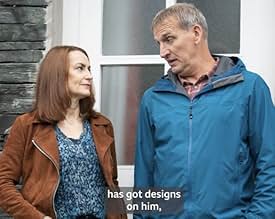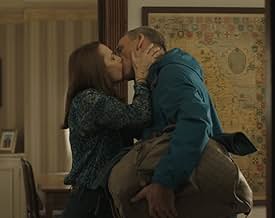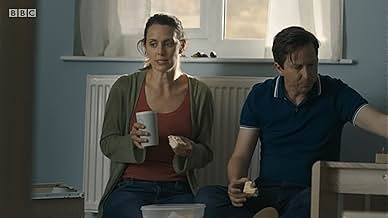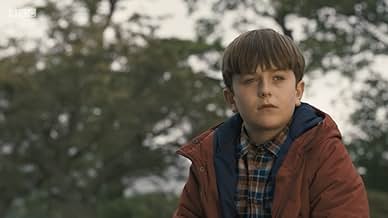ÉVALUATION IMDb
7,8/10
2,5 k
MA NOTE
La famille Hughes est une famille comme les autres, jusqu'au jour où leur fils cadet reçoit un diagnostic d'autisme.La famille Hughes est une famille comme les autres, jusqu'au jour où leur fils cadet reçoit un diagnostic d'autisme.La famille Hughes est une famille comme les autres, jusqu'au jour où leur fils cadet reçoit un diagnostic d'autisme.
- Prix
- 3 nominations au total
Parcourir les épisodes
Histoire
Le saviez-vous
- Anecdotes"The A Word" is based on the 2010 Israeli TV Series "Pilpelim Tsehubim" (Yellow Peppers), created and written by Keren Margalit.
- ConnexionsFeatured in The Wright Stuff: Episode #21.55 (2016)
Commentaire en vedette
No-one does TV drama like the BBC. The Americans do it very well, but not in the same way. But no-one gets it so annoyingly, irritating, piously and awkwardly wrong like the BBC either.
Let's get the good one out of the way first - the writing by Peter Bowker in The A Word is stunning. It brings to life the complexities of a family challenged by the sinking realism that their beautiful son has autism. The direction and photography and sense of place is spot on. Sometimes it's the little touches that make a difference. I'm sure a continuity anorak like me, but with more detailed knowledge of the English Lakes, will tell you what's wrong, but I liked the fact that they nip to Lancaster. You do, when you live up there. A lazier writer would have looked at a map and sent them to Penrith.
Apart from poor Joe, the 5 year old at the centre of the story, but always on the edge of it, the characters all drive you mad. Well, families do, don't they? Sometimes they work it out and sometimes they can't.
I hesitated before watching it, so I've binged on it this week. I don't need a TV drama to know what effect a child with profound special educational and emotional needs has on a family. It's uncomfortable, the shock, the stages of comprehension and the allowances you make are all there. But more than anything is the love, protective sometimes,irrational, confused and flawed, but real love. There are times I've hid behind the sofa in a way I haven't since Doctor Who, as there are reactions and emotions on display that ring too true. I read somewhere that it didn't speak a truth about one reviewer's autistic brother. Maybe so, but that's not the point. It didn't try to be the last word on autism any more than it is about the tensions of succession in family businesses.
The real skill is that actually, really, nothing much is happening. It's just the stuff of life. I don't crave realism - I'm addicted to the Walking Dead afterall - but this is where The A Word is bang on. I've sat at a bus stop in a rural Northern village with my schoolfriends and then watched a scene in The A Word and gone, yes, that works for me. I've seen teachers tip-toe around issues and I know how hard it is to fight for extra support. Yes, all good.
At the end of it all though it's the writing. You can create the most fantastic high concept of a story but without character you can believe in, then it's sunk.
Let's get the good one out of the way first - the writing by Peter Bowker in The A Word is stunning. It brings to life the complexities of a family challenged by the sinking realism that their beautiful son has autism. The direction and photography and sense of place is spot on. Sometimes it's the little touches that make a difference. I'm sure a continuity anorak like me, but with more detailed knowledge of the English Lakes, will tell you what's wrong, but I liked the fact that they nip to Lancaster. You do, when you live up there. A lazier writer would have looked at a map and sent them to Penrith.
Apart from poor Joe, the 5 year old at the centre of the story, but always on the edge of it, the characters all drive you mad. Well, families do, don't they? Sometimes they work it out and sometimes they can't.
I hesitated before watching it, so I've binged on it this week. I don't need a TV drama to know what effect a child with profound special educational and emotional needs has on a family. It's uncomfortable, the shock, the stages of comprehension and the allowances you make are all there. But more than anything is the love, protective sometimes,irrational, confused and flawed, but real love. There are times I've hid behind the sofa in a way I haven't since Doctor Who, as there are reactions and emotions on display that ring too true. I read somewhere that it didn't speak a truth about one reviewer's autistic brother. Maybe so, but that's not the point. It didn't try to be the last word on autism any more than it is about the tensions of succession in family businesses.
The real skill is that actually, really, nothing much is happening. It's just the stuff of life. I don't crave realism - I'm addicted to the Walking Dead afterall - but this is where The A Word is bang on. I've sat at a bus stop in a rural Northern village with my schoolfriends and then watched a scene in The A Word and gone, yes, that works for me. I've seen teachers tip-toe around issues and I know how hard it is to fight for extra support. Yes, all good.
At the end of it all though it's the writing. You can create the most fantastic high concept of a story but without character you can believe in, then it's sunk.
- themarpleleaf
- 20 mai 2020
- Lien permanent
Meilleurs choix
Connectez-vous pour évaluer et surveiller les recommandations personnalisées
- How many seasons does The A Word have?Propulsé par Alexa
Détails
- Date de sortie
- Pays d’origine
- Site officiel
- Langue
- Aussi connu sous le nom de
- The a Word
- Lieux de tournage
- sociétés de production
- Consultez plus de crédits d'entreprise sur IMDbPro
- Durée1 heure
- Couleur
Contribuer à cette page
Suggérer une modification ou ajouter du contenu manquant




















